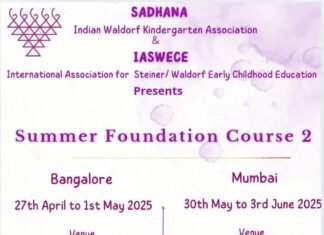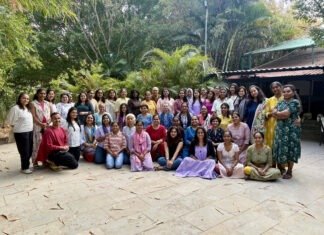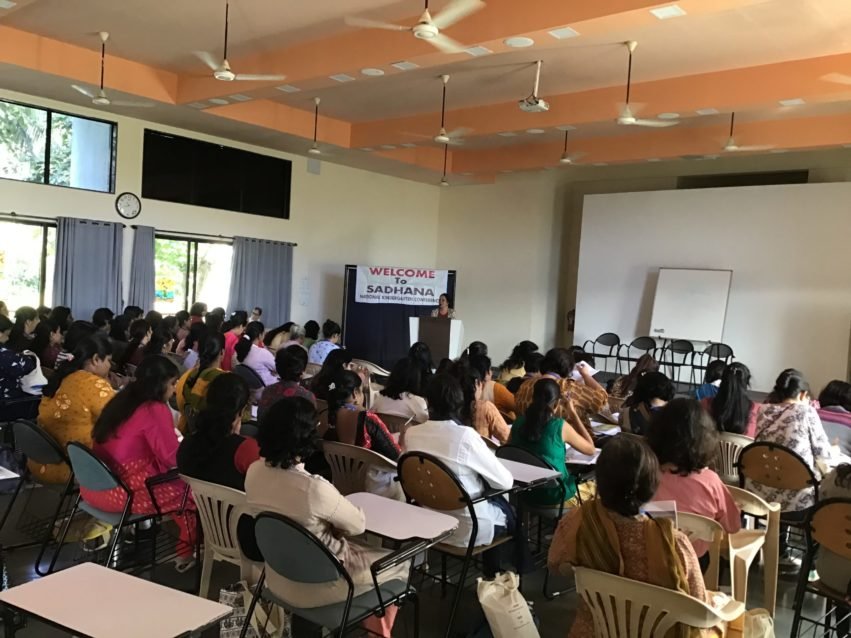Essential Characteristics of Waldorf/Steiner Early Childhood Education
The future development of each individual child and of humanity as a whole depends on health-giving experiences in the first seven years of life. An atmosphere of loving warmth and guidance that promotes joy, wonder, and reverence supports such healthy development.
The most essential aspect of the work with the little child is the inner attitude of the educator, who provides the example for the child’s imitation. Therefore the work of the Waldorf educator demands an ongoing process of research and self- education including anthroposophical* study, meditative practice, artistic and practical activity.
In Waldorf nursery-kindergartens, home care programs, childcare centers, parent-child programs and other settings, foundations are laid for later learning and healthy development, including life-long physical, social, emotional, intellectual, and spiritual growth.
This education, based on an understanding of the development of human individuality, offers protection and respect for the dignity of childhood. It includes an understanding of the unfolding development of the child from pre-birth to seven, including the unique significance of the development of walking, speaking and thinking in the first three years of life.
Activities in Waldorf early childhood education take into consideration the age-specific developmental needs of young children, from a focus on will-oriented physical activity in the first three years, then on imaginative play in the middle years of early childhood, and later a more cognitive approach to learning after the child enters school.
Educational Principles
Waldorf based programs may differ according to geography, culture, group size, age-range, and individual teaching approach. Granting these differences, Waldorf programs share certain fundamental characteristics:
- Loving interest in and acceptance of each child
- Opportunities for self-initiated play with simple play materials as the essential activity for young children. This is the young child’s work and makes it possible for them to digest and understand their experiences.
- Awareness that young children learn through imitation, through the experience of diverse sensory impressions, and through movement. Their natural inclination is to actively explore their physical and social environment. The surroundings offer limits, structure and protection, as well as the possibility to take risks and meet challenges.
- A focus on real rather than virtual experiences to support the child in forming a healthy relationship to the world.
- Artistic activities such as storytelling, music, drawing and painting, rhythmic games, and modeling that foster the healthy development of imagination and creativity.
- Meaningful practical work such as cooking, baking, gardening, handwork and domestic activity that provide opportunities to develop unfolding human capacities. Here the emphasis is on the processes of life rather than on learning outcomes.
- Predictable rhythms through the day, week and year that provide security and a sense of the interrelationships and wholeness of life. Seasonal and other festivals are celebrated according to the cultural and geographical surroundings.
We recognize that healthy child development unfolds most fully in the context of a community with healthy social relationships among parents, teachers and children. Waldorf educators strive to create such conscious, collaborative communities around the children in their care and see their activity as part of a worldwide cultural impulse.
*Anthroposophy is the name that Rudolf Steiner gave to the study of the human being. He considered it to be a holistic mode of inquiry based on the meeting of empirical observation with inner reflection.
The Universal Human Spirit of Waldorf Early Childhood Education
Born out of Rudolf Steiner’s Anthroposophy, the first Waldorf School was founded in Germany in 1919. The first Waldorf Kindergarten followed seven years later. Since then a deep interest in Anthroposophy and Steiner Waldorf early childhood education has resulted in more than 2000 kindergartens being founded in 80 countries around the world.
The International Association for Steiner/Waldorf Early Childhood Education (IASWECE) provides a meeting place for early childhood educators from the many countries striving to uphold, deepen and renew Steiner/Waldorf early childhood education. Our shared task is to ensure that Waldorf pedagogy becomes neither a theoretical system, nor a collection of outer methods, but a wellspring of living insight.
To serve the healthy development of childhood is to develop the potential to perceive, through our own self-directed inner activity, not only the physical nature, but also the soul and spirit of each child.
Through this ongoing study and research we deepen our appreciation of the spiritual individuality of all human beings, as distinct from but working within and through the sheaths of their given gender, temperament and personality, as well as through the traditions and values of their particular family and cultural community.
Every culture contributes uniquely towards the evolution of Anthroposophy and Waldorf education, and we honor the way Steiner/Waldorf early childhood educators work within their specific cultural contexts.
At the same time, we would like to express our hope that, by encouraging the autonomy and initiative of each individual, Anthroposophy and Waldorf education may contribute to the evolution of the “whole,” such as family, community, nation, and humankind.
IASWECE gives us, as educators from diverse nations and cultures, the opportunity to meet and get to know and understand one another on an ever-deeper level. Developing relationships of trust, openness and reverence among colleagues, with the young child always at the centre of our vision, is the starting point for educating in freedom and toward freedom.
Out of this ideal comes our intention to participate in a dynamic and artistic process that will enable the universal human spirit of Waldorf pedagogy to light up in the hearts and creative will of educators of all cultures. Only then can we give children in every corner of the world the opportunity to develop their true and full humanity.









